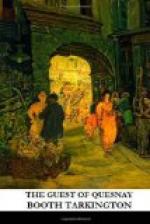The afternoon following our first dinner together, the two, in returning from their walk, came into the pavilion with cheerful greetings, instead of going to their rooms as usual, and Keredec, declaring that the open air had “dispersed” his rheumatism, asked if he might overhaul some of my little canvases and boards. I explained that they consisted mainly of “notes” for future use, but consented willingly; whereupon he arranged a number of them as for exhibition and delivered himself impromptu of the most vehemently instructive lecture on art I had ever heard. Beginning with the family, the tribe, and the totem-pole, he was able to demonstrate a theory that art was not only useful to society but its primary necessity; a curious thought, probably more attributable to the fact that he was a Frenchman than to that of his being a scientist.
“And here,” he said in the course of his demonstration, pointing to a sketch which I had made one morning just after sunrise—“here you can see real sunshine. One certain day there came those few certain moment’ at the sunrise when the light was like this. Those few moment’, where are they? They have disappeared, gone for eternally. They went”—he snapped his fingers—“like that. Yet here they are—ha!—forever!”
“But it doesn’t look like sunshine,” said Oliver Saffren hesitatingly, stating a disconcerting but incontrovertible truth; “it only seems to look like it because—isn’t it because it’s so much brighter than the rest of the picture? I doubt if paint can look like sunshine.” He turned from the sketch, caught Keredec’s gathering frown, and his face flushed painfully. “Ah!” he cried, “I shouldn’t have said it?”
I interposed to reassure him, exclaiming that it were a godsend indeed, did all our critics merely speak the plain truth as they see it for themselves. The professor would not have it so, and cut me off.
“No, no, no, my dear sir!” he shouted. “You speak with kindness, but you put some wrong ideas in his head!”
Saffren’s look of trouble deepened. “I don’t understand,” he murmured. “I thought you said always to speak the truth just as I see it.” “I have telled you,” Keredec declared vehemently, “nothing of the kind!”
“But only yesterday—”
“Never!”
“I understood—”
“Then you understood only one-half! I say, ’Speak the truth as you see it, when you speak.’ I did not tell you to speak! How much time have you give’ to study sunshine and paint? What do you know about them?”
“Nothing,” answered the other humbly.
A profound rumbling was heard, and the frown disappeared from Professor Keredec’s brow like the vanishing of the shadow of a little cloud from the dome of some great benevolent and scientific institute. He dropped a weighty hand on his young friend’s shoulder, and, in high good-humour, thundered:
“Then you are a critic! Knowing nothing of sunshine except that it warms you, and never having touched paint, you are going to tell about them to a man who spends his life studying them! You look up in the night and the truth you see is that the moon and stars are crossing the ocean. You will tell that to the astronomer? Ha! The truth is what the masters see. When you know what they see, you may speak.”




